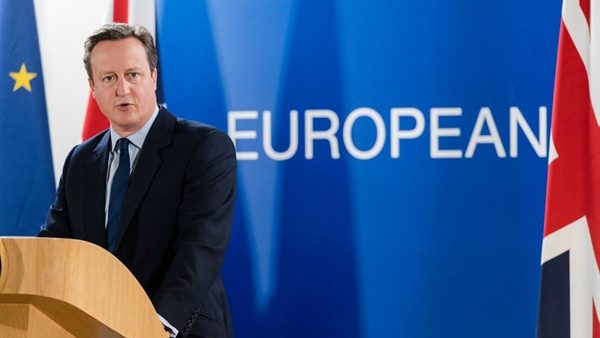In the months and weeks preceding the British referendum on its European Union membership, speculation abounded over the potential implications of a U.K. withdrawal from the bloc. Once Britons voted to leave last week, global markets took a hit, as did the EU’s aspirations for further political integration. World Politics Review’s 10-article compilation helps trace what led up to the historic vote, and considers its potential implications for the U.K., the European Union and beyond.
The Road to Brexit
U.K.’s Cameron Pursues Risky Strategy for EU Reform
In 2013, British Prime Minister David Cameron—who is now set to resign in October—first set out his agenda for renegotiating Britain’s relationship with the EU and push to reform the bloc, in anticipation of a referendum on membership. But, as Thomas Raines wrote in February 2013 after Cameron presented his plans to the British public, the prime minister was bound to face a series of hurdles that remain relevant today as the terms of a Brexit are being contemplated.
Cameron’s EU Referendum: Lucky Gamble or Mission Impossible?
Few predicted that Cameron would be re-elected last year, and, accordingly, didn’t take seriously the prospect of a British referendum on the U.K.’s EU membership. But his narrow victory in May 2015 put it back on the agenda. At the time, however, Matthias Matthjis wrote that the prime minister’s demands for a “new deal” with Europe were fuzzy, making the referendum a risky bet, empowering Euroskeptics and compromising Britain’s global role.
Cameron’s Brexit Referendum Ploy Could Lead to Broader EU Reforms
Just two months ahead of last week’s Brexit referendum, economists were warning about the impact withdrawing from the EU would have on the U.K. economy. But the British public, Milton Ezrati wrote in April, was more likely to vote based on concerns over sovereignty and culture. And, as has been borne out in the aftermath of the vote, Cameron’s efforts were likely to prompt other EU members, particularly right-wing parties, to raise similar concerns—with implications for the EU, if no longer for Britain.
Dysfunctional Democracy and Referenda: The Case of Brexit
With weeks to go before the referendum, Matthias Matthijs wrote in June that Cameron had gotten himself into a much bigger mess than he ever bargained for. That’s because, although referenda certainly enhance the process of democratic participation, their outcomes are largely negative—it’s not the job of ordinary people to constantly deliver judgment on complicated matters of state, and the EU has a weak record on national referenda.
Brexit Raises Economic and Security Fears in Central and Eastern Europe
Writing from Belgrade, Andrew MacDowall catalogued growing discomfort over Brexit in Central and Eastern Europe, both from Britain’s Euroskeptic allies already within the EU and nonmembers that have long enjoyed London’s support. In the western Balkans, fears mounted that a Brexit would prompt the EU’s unwinding, with consequences for the region’s peace and development; in Warsaw, officials were concerned that a U.K. withdrawal would cost Poland its counterweight to German influence.
European Democracy’s Accountability Problem
Populists and Technocrats in Europe’s Fragmented Democracies
Eight years since it erupted, the euro crisis is far from resolved. One result, Jan-Werner Müller argued in May, is the fragmentation of party systems across Europe, marked by the rise of populism and technocracy’s emergence as a regime in its own right—two major forces behind the Brexit vote. The question, Müller wrote, is whether movements rejecting certain European policies will prompt change in Brussels.
Invisible Benefits: Why Bashing the EU Is So Easy
The European Union is widely considered by students of international relations to be the most successful experiment in international cooperation in human history, John Peterson wrote in 2013. Yet, it is also the subject of increasingly vitriolic criticism by populist parties across Europe, who attack it as an elitist, undemocratic albatross—the rallying platform of the “leave” campaigners.
Depleted Capital: The State of European Social Democracy
Over the past decade, social democratic parties across Western Europe have been in retreat, with many commentators insisting they are destined to wane as a political force. Last July, Patrick Diamond considered the factors behind social democracy’s slide, with an eye toward some possible ways to stem the left’s demise.
Anti-Refugee Backlash Will Benefit Europe’s Far-Right Parties
As the number of migrants risking their lives to reach Europe escalated, Frida Ghitis wrote in September that one thing was certain: The massive wave of immigration will usher a powerful backlash that will benefit right-wing anti-immigrant parties. That will deepen rifts between the political left and right and enable a galvanized right wing to exploit refugees’ plight for political gain.
Europe and the Ongoing Challenge of Right-Wing Extremism
Though Europe has consistently struggled to escape fully from the shadows of fascism and far-right politics, the landscape of postwar European politics has never truly been “far-right free,” Matthew Goodwin wrote in January 2013. Far from being ephemeral, the far right in postwar Europe has proved to be remarkably resilient. That is now more on display than ever, as right-wing parties, capitalizing on xenophobia, coalesce around the Brexit vote and against the migrants arriving at Europe’s shores.

